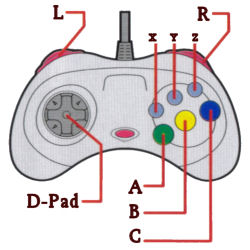
| General | Menus | Dialogue | |
|---|---|---|---|
| A | Bring up menu | Select | Advance dialogue |
| B | Cancel | Advance dialogue | |
| C | Talk / Activate / Check | Select | Advance dialogue |
| D-Pad | Move on screen | Move cursor | |
| L | Left character | ||
| R | Right character |
| Magical School Lunar - Controls | |
| [Main | Controls | Menus | Characters | Places | Magic | Usage | Notes] | [Chapters: Prologue | 01 | 02 | 03 | 04 | 05 | 06 | 07 | 08 | 09 | 10 | 11 | 12] |
| Sections | ||
|---|---|---|
|
Controls |
Magic Notes |
General Notes |
Controls
 |
|
Magic Notes
There are a few things to note about how magic works in this game. Since Magical School Lunar is about, well, a Magic School, magic and learning new spells figures prominently in this game.
First, there are two main kinds of spells:
Second, you do not learn magic spells by gaining levels! You learn them instead by talking with the professors at the Magic School. Some spells are learned automatically, in the normal course of the game, and some are not. There are two basic ways to learn new spells:
Everything about how, when, and where to learn magic is described in detail in the Magic section.
General Notes
There are a few things to note about how Magical School Lunar plays, particularly compared to other games in the Lunar series. There's no need to mention everything, but to give a brief rundown, here are some things to keep in mind:
The "Magic" in "Magical School Lunar":
Magical School Lunar is about magic... Every battle, you're going to use magic to get through it. So, the strategy you take to battles is going to be very different. There's no sense in being stingy about MP usage--instead, pace out how you use your magic, and defend occasionally to regain MP. It takes some getting used to, but it's a different and more interesting setup when compared to other Lunar games. See below the points about the high encounter rate and MP restoration for more.
The high encounter rate:
Magical School Lunar is a great game. But, it has one downfall: the encounter rate is atrocious. While going through dungeons and caves, you'll usually spend about 5-15 seconds walking between battles, and another 40-50 seconds in battle, on average. Now, the good news is that the way the game is structured, you can play through it in a way that the encounter rate isn't a huge problem. Specifically, this means:
If you stick to this, then you can end most battles in 1-3 turns or under a minute each. That way, the game becomes much less burdensome and a lot more fun to play.
There are no items or treasure chests to find:
The only items you receieve are story-related. So, there's no need to explore every part of a dungeon. Restorative items (like Herbs and Star Lights) aren't that necessary, since many of the students have healing magic, and you can regain MP on the field (see below on how to regain MP).
Range does not matter in battle, but position does:
There is no limit to range when in battle; so, you can run from one end of the field to the other and attack (the same goes for enemies). However, position on the field does affect how area-effect spells operate. So, it's sometimes worthwhile to spread out the students during some boss battles.
MP restoration:
It costs MP to cast any magic spell. But, there are many ways to regain MP during the game. There are two ways to regain MP gradually:
Defending during battle is the most convenient way. If a few of the students are running very low on MP, then it's a good strategy to: get into a battle, defeat all but one weak enemy, and have everyone defend and heal as needed until MP is restored (it takes only a minute or two). This way, you can go nearly all-out in every battle without worrying about using all your magic.
Also, it's sometimes useful to keep an eye on when you're expecting to gain another level. In fact, you might want to try and keep everyone in your party at about the same level of EXP, so everyone gains a level at about the same time; this means never having one student run away or die while the others are left to fight.
| [Main | Controls | Menus | Characters | Places | Magic | Usage | Notes] | [Chapters: Prologue | 01 | 02 | 03 | 04 | 05 | 06 | 07 | 08 | 09 | 10 | 11 | 12] |

Website ©2008-2009 K. Farooque
Magical School Lunar and all source material ©Game Arts / Studio Alex.
Credit Kizyr/LunarNET if you post information from this guide. Do not copy
or post this walkthrough in part (over 5 pages) or in full without permission.